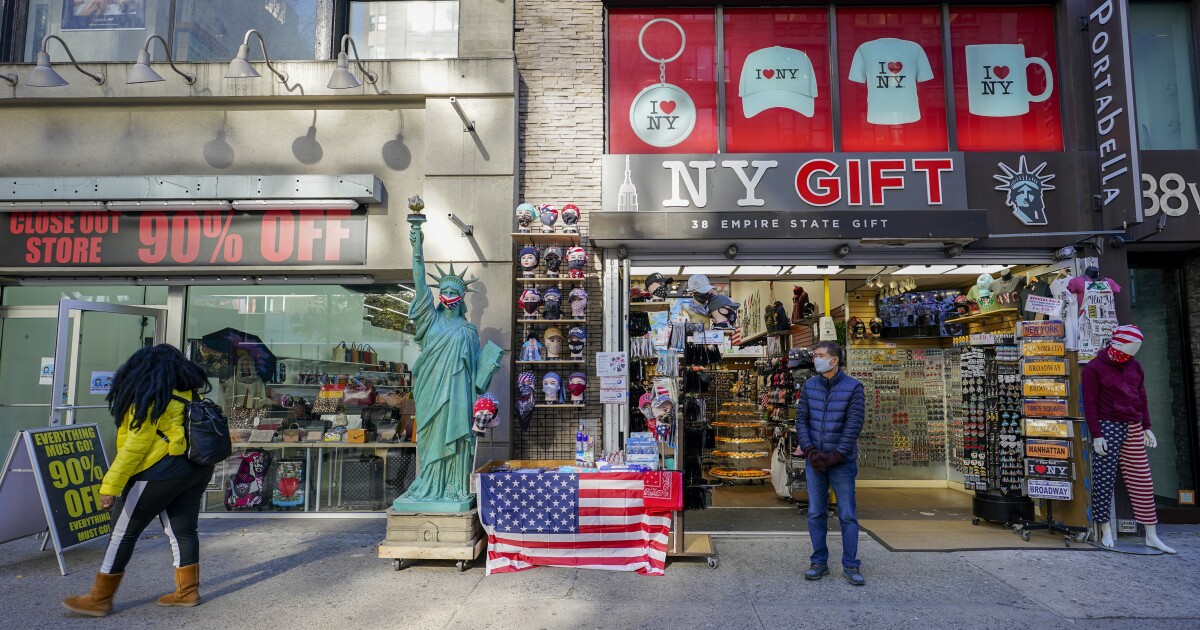In souvenir shops, from Times Square to the World Trade Center, the shelves full of T-shirts and trinkets are still (heart) New York. But owners wonder when their customers will do it again.
The coronavirus pandemic took a voracious bite out of a slice of New York life as recognizable as a slice of pizza: the clipped and sometimes electronic gift bar shops that dot tourist-oriented areas, featuring statuettes of the Statue. of Liberty, toy cabs, NYPD caps, Big Apple fridge magnets and anything with the coat of arms famoso logo “I (HEART) NY”.
Like the miniature snow globes they sell, the shops are a microcosm of a city that has flourished attracting visitors from around the world and now feels their absence.
“It’s a fight for survival,” Ali Zaidi said one recent morning at his store two blocks from the World Trade Center. And with the increase in coronavirus cases and the approach of winter, what would normally be the increase in a busy holiday season is “getting worse and worse, day after day.”
Before the pandemic, his Broadway Gifts store typically saw hundreds of customers a day, many tourists, but also local office workers looking for gloves, cell phone chargers or other practical items, he said. Now, with few out-of-town visitors and many residents still working from home, an average day can generate between 25 and 50 people and $ 300 or less in sales, a small fraction of normal business, says Zaidi, who owns another store. . souvenirs in downtown Manhattan.
After being closed for more than three months after the city shut down nonessential retail in March, Zaidi says he used all of the savings in the business to keep it running, while making some discounts with its owners and keeping his staff on it. smallest possible. – It’s just him and three relatives. Still, he had to slash orders for Christmas items, he said.
“I wish I could offer more to my clients, so they could have a good Christmas with beautiful decorations on their trees,” said Zaidi, who says he is in business not only to earn a living, but because selling gifts “brings joy. for others. ”
However, he says he is “very optimistic” that the pandemic will eventually reverse and business will recover.
“We have to give the city positive energy to bring it back to life,” said Zaidi.
After breaking records year after year since 2010, trips to the largest city in the United States have plummeted since the Broadway theaters pandemic, closing many other attractions for months, and initiating a federal ban on some foreign visitors and New York quarantine rules that affected many interstate arrivals.
City travel agency NYC & Co. now projects visitors to number about 23 million this year, an “unprecedented drop” from more than 66 million last year, though the agency predicts numbers will pick up to get there. to new ones. records in 2024. Hotel occupancy is down by 80% of normal and traffic at metropolitan area airports by approximately 75%, according to the New York Hotel Association and the Port Authority of New York and New Jersey .
Autonomous gift, souvenir and novelty stores totaled about 4,000 employees and $ 125 million in payroll last year, according to the city’s Economic Development Corporation. But if its economic footprint is small, around 0.1% of private sector jobs in the city, the symbolic presence of stores is greater. They are a sufficiently New York institution that a recent “Saturday Night Live” parody was established in one.
In the souvenir shops in Times and Herald squares, visitors were in short supply on a recent noon afternoon. Workers spoke of small teams and, in some places, hours between sales.
A little further south, near the iconic Flatiron Building, Alper Tutus sported a “New York resistant” mask as he perused the products he curated over 35 years in the electronics and souvenir business.
Pointing to a wide selection of postcards, movie star T-shirts and other specialties, she recalled the days before the pandemic, when customers lined up at the cash register that dropped off their two daughters at college.
Today, Tutus worries about covering the expenses of the store, with the monthly rent that, according to him, is in the tens of thousands of dollars.
The situation discourages him for a while, but he believes in the potential of the city and his own: “I never give up,” he said.
Working seven days a week, the septuagenarian says he has spoken with the owner and hopes the state or federal government can offer more help to stores like his.
Although hotels, restaurants and other businesses are important to the city’s tourism, he says that souvenir shops have their own special place, providing tangible connections to the city that visitors take home.
“Reflect your love, reflect your memories,” Tutus said. “These little, little things, they make you so happy.”
–


